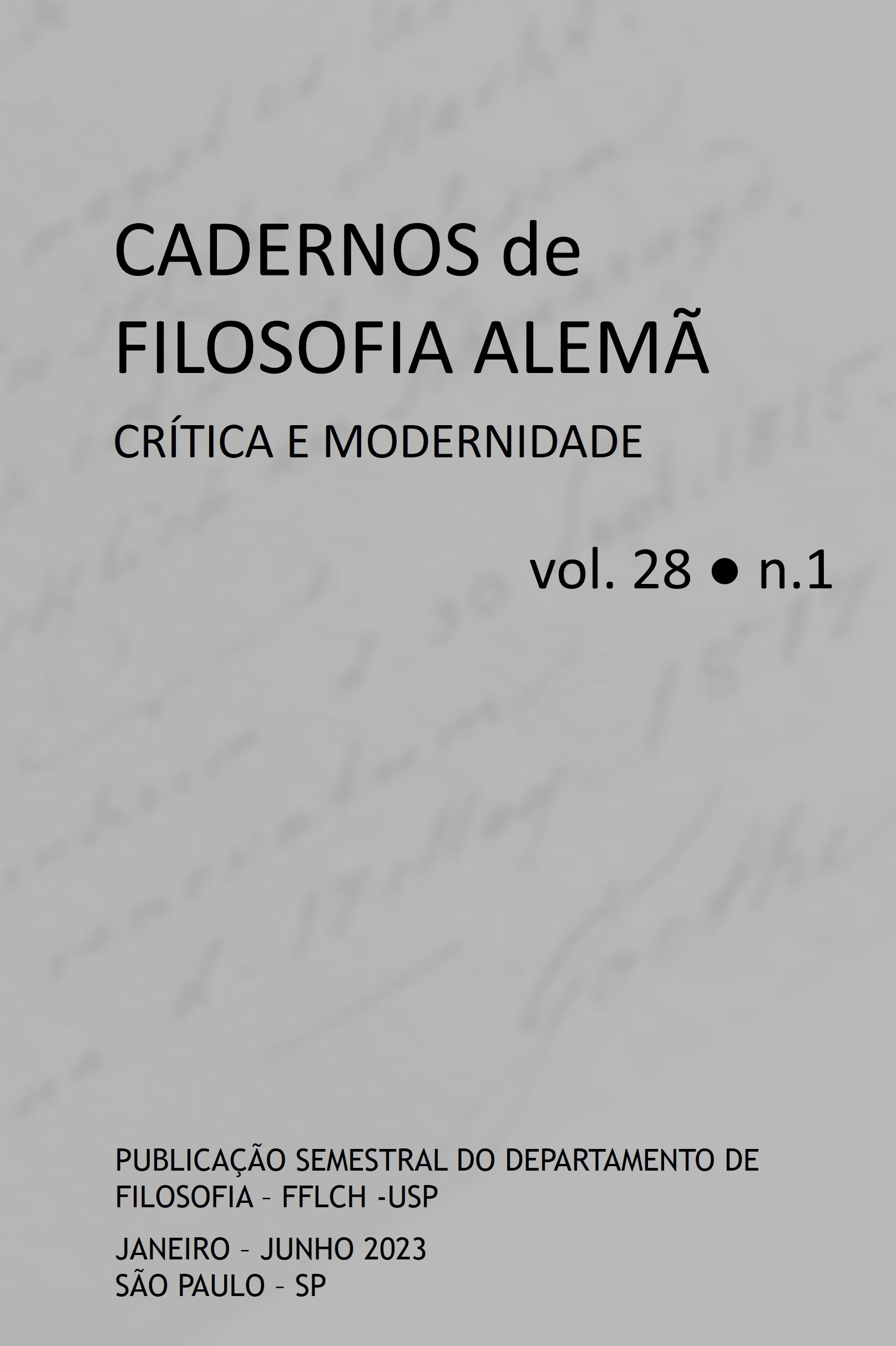Transcendental deduction and realism in the Critique of Pure Reason
DOI:
https://doi.org/10.11606/issn.2318-9800.v28i1p43-60Keywords:
Kant, Hume, Transcendental Deduction, Refutation of Idealism, BerkeleyAbstract
The article addresses the merits of the Transcendental Deduction, a central argument for the Critique of Pure Reason, with regard specifically to the clash with Hume's epistemological skepticism. The idea is developed that the price paid by Kant in his anti-Humean project, the transcendental idealist position, although conceptually distinct from Berkeley's idealism and, in fact, the consequent development of a more general modern anti-realism, is still and precisely because of this common commitment in a territory that is unavoidably vulnerable to the critique of knowledge, hence the presence of a dogmatic foundation implicit in this point of Kant's work.
Downloads
References
Anônimo (2000). “Critique of Pure Reason by Immanuel Kant. 1781. 856 pages in Octavo”. In: Sassen, B. (ed.). Kant’s Early Critics. Cambridge: Cambridge University Press, pp. 53-58.
Almeida, G. A. de. (2013). Kant e a Refutação do Idealismo II. Analytica, Rio de Janeiro, 17(2), 13-50.
Altmann, S. (2017). Propósito e estrutura do Quarto Paralogismo. Analytica, Rio de Janeiro, 21(1), 85-121.
Ameriks, K. (1978). Kant’s Transcendental Deduction as a Regressive Argument. Kant Studien, 69(1-4), 273-87. DOI: https://doi.org/10.1515/kant.1978.69.1-4.273
Ayers, M. (1982). Berkeley’s Immaterialism and Kant’s Transcendental Idealism. Royal Institute of Philosophy Supplement, 13, 51-69. DOI: https://doi.org/10.1017/S0957042X0000153X Beiser, F. (1987). The Fate of Reason. Cambridge: Harvard University Press.
Berkeley, G. (1973). Tratado sobre os princípios do conhecimento humano. In: Berkeley, G.; Hume, D. Os Pensadores (vol. XXIII), pp. 7-50.
Caranti, L. (2007). Kant and the scandal of philosophy: the Kantian critique of Cartesian scepticism. Toronto: University of Toronto Press.
Conant, J. (2016). Why Kant is not a Kantian. Philosophical Topics, 44(1), 75-125. DOI: https://doi.org/10.5840/philtopics20164417
Gardner, S. (1999). Kant and the Critique of Pure Reason. London: Routledge.
Gardner, S. (2015). “Introduction: The Transcendental Turn”. In: Gardner, S. e Grist, M. (eds.). The Transcendental Turn. Oxford University Press, pp. 1-19.
Guyer, P. (1982). Kant’s tactics in the Transcendental Deduction. Philosophical topics 12(2), 157-99. DOI: https://doi.org/10.5840/philtopics198112229
Guyer, P. (1986). The Failure of the B-Deduction. The Southern Journal of Philosophy, 25(54), n. S1, 67-84. DOI: https://doi.org/10.1111/j.2041-6962.1987.tb01652.x
Kant, I. (1902). Kants Gesammelte Schriften: herausgegeben von der Königlich Deutschen Akademie der Wissehschaften. Berlin: Felix Meiner, 29 vols.
Kant, I. (2012). Crítica da razão pura. Tradução de Fernando Costa Mattos. Petrópolis: Vozes.
Kant, I. (2014). Prolêgomenos a qualquer metafísica futura que possa apresentar-se como ciência. Tradução de José Oscar de Almeida Marques. São Paulo: Estação Liberdade.
McDowell, J. (1994). Mind and World. Cambridge: Harvard University Press.
Rego, P. (2013). Fenomenismo, realismo e as coisas “fora de nós”. Kant contra o idealista material. Analytica, Rio de Janeiro, 17(2), 96-118.
Rego, P. (2018). O que exatamente o ‘eu penso’ tem que poder acompanhar? Revisitando a dedução transcendental das categorias. Studia Kantiana, 16(3), 7-26.
Strawson, P. (1966). Bounds of Sense. An Essay on Kant’s Critique o f Pure Reason. New York: Methuen.
Stroud, B. (1968). Transcendental Arguments. Journal of Philosophy, 65, pp. 241-56. DOI: https://doi.org/10.2307/2024395
Downloads
Published
Issue
Section
License
Copyright (c) 2023 Gabriel Cunha Hickmann

This work is licensed under a Creative Commons Attribution-NoDerivatives 4.0 International License.
Information and conceptions on the texts are complete responsibility of the authors.
All the articles submitted before July 5th 2018 and those published after July 2021 are licensed under a CC BY-NC-ND license – except those published between the aforementioned dates, which are under the CC BY-NC-SA license. The permission for the translation of the material published under the license CC BY-NC-ND by third parts can be obtained with the consent of the author.
Open access policies - Diadorim
Rules applied before July 5th 2018:
Presenting a submission to our Editorial Board implies granting priority of publication for “Cadernos de filosofia alemã”, as well as transferring the copyright of texts (once published), which will be reproduced only with the manifest authorization of the editors. Authors keep the right to reuse the texts published in future editions of their work, without paying any fees to "Cadernos”. We will not grant the permission to re-edit or translate the texts for third parts without agreement of the author.


